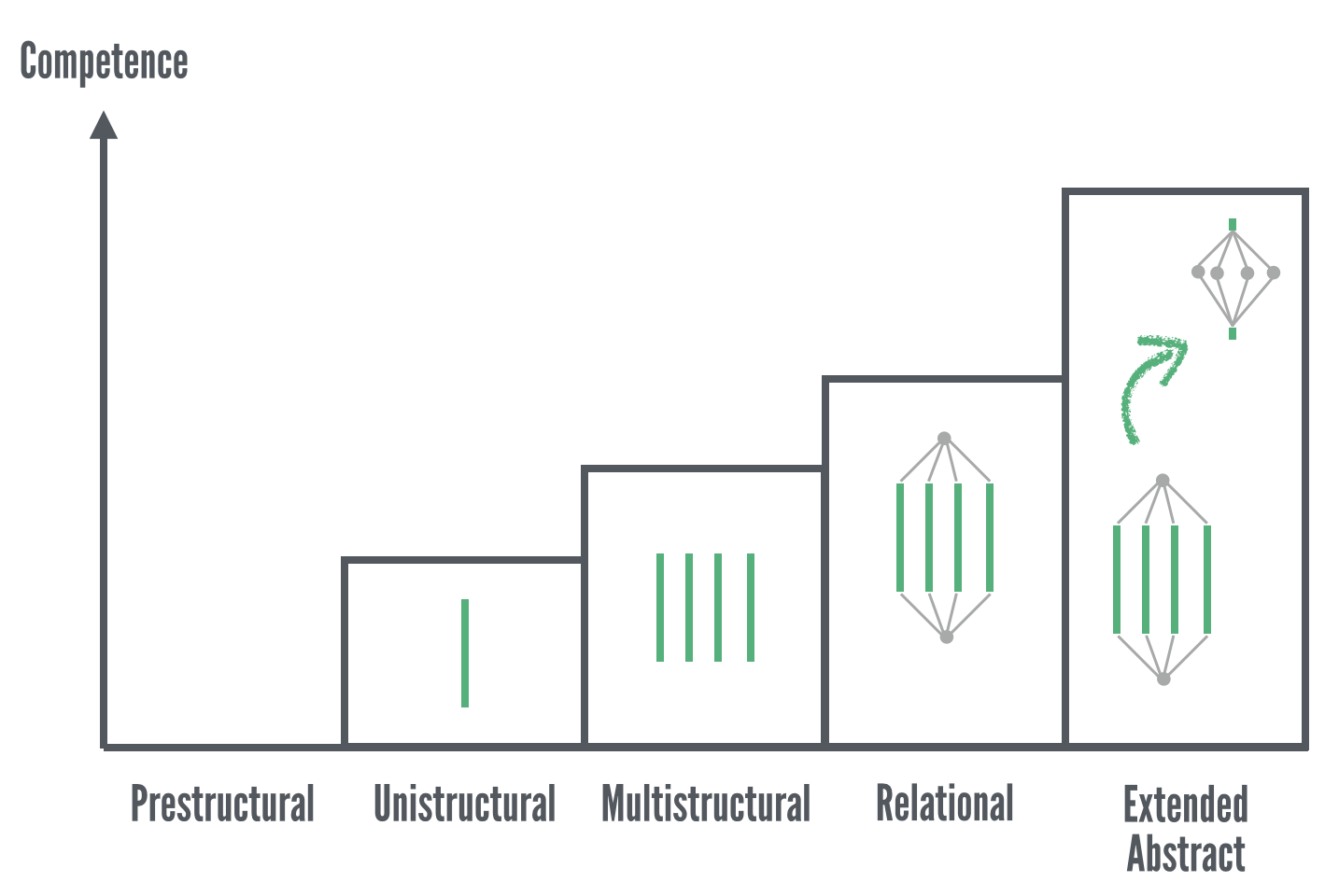The benefits of Artificial Intelligence
As an historian, I’m surprisingly bad at recalling facts and dates. However, I’d argue that the study of history is actually about the relationship between those facts and dates — which, let’s face it, so long as you’re in the right ballpark, you can always look up.
Understanding the relationship between things, I’d argue, is a demonstration of higher-order competence. This is described well by the SOLO Taxonomy, which I featured in my ebook on digital literacies:

This is important, as it helps to explain two related concepts around which people often get confused: ‘artificial intelligence’ and ‘machine learning’. If you look at the diagram above, you can see that the ‘Extended Abstract’ of the SOLO taxonomy also includes the ‘Relational’ part. Similarly, the field of ‘artificial intelligence’ includes ‘machine learning’.
There are some examples of each in this WIRED article, but for the purposes of this post let’s just leave it there. Some of what I want to talk about here involves machine learning and some artificial intelligence. It’s all interesting and affects the future of tech in education and society.
If you’re a gamer, you’ll already be familiar with some of the benefits of AI. No longer are ‘CPU players’ dumb, but actually play a lot like human players. That means with no unfair advantages programmed in by the designers of the game, the AI can work out strategies to defeat opponents. The recent example of OpenAI Five beating the best players at a game called Dota 2, and then internet teams finding vulnerabilities in the system, is a fascinating battle of human versus machine:
“Beating OpenAI Five is a testament to human tenacity and skill. The human teams have been working together to get those wins. The way people win is to take advantage of every single weakness in Five—some coming from the few parts of Five that are scripted rather than learned—gradually build up resources, and most importantly, never engage Five in a fair fight.” OpenAI co-founder Greg Brockman told Motherboard.Deepfakes, are created via "a technique for human image synthesis based on artificial intelligence... that can depict a person or persons saying things or performing actions that never occurred in reality". There's plenty of porn, of course, but also politically-motivated videos claiming that people said things they never did.
There’s benefits here, though, too. Recent AI research shows how, soon, it will be possible to replace any game character with one created from your own videos. In other words, you will be able to be in the game!
It only took a few short videos of each activity -- fencing, dancing and tennis -- to train the system. It was able to filter out other people and compensate for different camera angles. The research resembles Adobe's "content-aware fill" that also uses AI to remove elements from video, like tourists or garbage cans. Other companies, like NVIDIA, have also built AI that can transform real-life video into virtual landscapes suitable for games.It's easy to be scared of all of this, fearful that it's going to ravage our democratic institutions and cause a meltdown of civilisation. But, actually, the best way to ensure that it's not used for those purposes is to try and understand it. To play with it. To experiment.
Algorithms have already been appointed to the boards of some companies and, if you think about it, there’s plenty of job roles where automated testing is entirely normal. I’m looking forward to a world where AI makes our lives a whole lot easier and friction-free.
Also check out:
- AI generates non-stop stream of death metal (Engadget) — "The result isn't entirely natural, if simply because it's not limited by the constraints of the human body. There are no real pauses. However, it certainly sounds the part — you'll find plenty of hyper-fast drums, guitar thrashing and guttural growling."
- How AI Will Turn Us All Into Filmmakers (WIRED) — "AI-assisted editing won’t make Oscar-worthy auteurs out of us. But amateur visual storytelling will probably explode in complexity."
- Experts Weigh in on Merits of AI in Education (THE Journal) — "AI systems are perfect for analyzing students’ progress, providing more practice where needed and moving on to new material when students are ready," she stated. "This allows time with instructors to focus on more complex learning, including 21st-century skills."